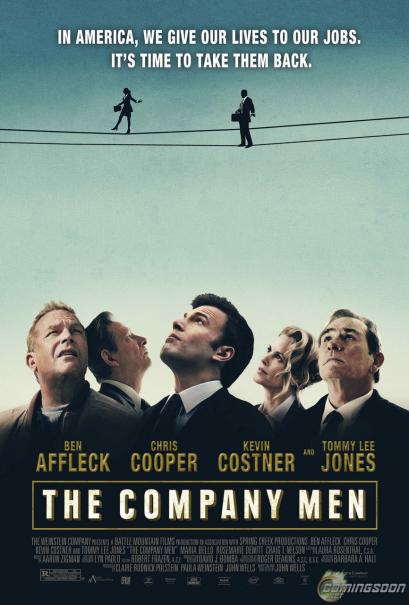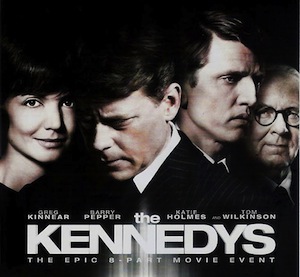“The Company Men” is a recession-era drama that follows three downsized executives at a huge conglomerate. Writer/director John Wells (producer of “ER” and “West Wing”) talked to me about the research that helped him to develop the script, how he had to keep amending the screenplay to stay accurate, the surprising reaction from audiences who think they know who the villain is, and what he learned about how men and women react differently to job loss.
This movie has an amazing group of actors, including Tommy Lee Jones, Ben Affleck, Chris Cooper, Maria Bello, Kevin Costner, and Rosemary DeWitt. How did you assemble your cast?
I kept sending the script out to people and they kept saying yes. The biggest surprise was Kevin Costner, who had read the script from his agent for a different part, called me up and said he really wanted to play Jack, the brother-in-law. I thought the agent had made a mistake when he told me that. He said he connected with that character and would love to do it if we could work it out. 
It feels very much of this moment and this economy. Did you do a lot of research?
I did a tremendous amount of research. It really came out because a member of my family lost his job. He started telling me about what was going on in his life in the time afterward. He had been very successful and this kind of caught him off guard and he had a lot of trouble finding another job because there were a lot of other people in his exact field looking at the same moment that he was. I went onto a bunch of different downsizing websites, places with chat rooms and put in little notices that said, “I’m a writer and I’m interested in this subject and if you want to tell me a few anecdotes, a few things about what’s happened in your life, let me know. I had a couple of thousand responses in the first weekend.
I ended up talking to literally hundreds of people, both people still working in companies, CEOs and human resources, and a lot of people who had actually or were actually going through this experience. A tremendous amount of the movie is just their experiences, things they told me.
I wrote an article about the corporation in the movies of 2010 and mentioned yours as exceptionally accurate, not just about the experience of being laid off but about the corporate environment and lines like the CEO saying that all that is left for American business is “health care, infrastructure, and power generation.”
Some of it changed as we made the movie because things kept changing. We made it right during the worst of the TARP period and were following things on a daily basis. When we made the film we assumed that the recession would be over by the time it was released and it would be an historical document. Things have gone on longer than we thought. When I was first writing about the film, I made it about the steel industry because I went to school in Pittsburgh. But when I went to scout it, it was gone.
So I had to talk to people about other heavy manufacturing and other and fabrication industries that might be suffering similar fates. One that was suggested was the auto industry, and I thought, “No, that’s ridiculous, no one would believe that the auto industry could go up in smoke.” Goes to show you what I knew! The other was non-military or non-protected ship-building. So I started looking around and we found that wonderful shipyard in Boston, which had only been closed a couple of years.
On a daily basis I had a couple of different people in the financial world who would keep me up to date on what was happening. When we started, there was still credit available. By the middle of it, we had to change things left and right to make corrections. The character Ben Affleck plays was originally working in new construction of homes. By the time we got to shooting it, the whole new home construction business had collapsed, so I had to switch to remodels. Six months later, that had also disappeared. The severity and depth of the recession is so much greater than anything I had ever experienced.
The things the corporate executives said to each other changed every day — the “infrastructure” line changed the day we shot it.
You focused on people we haven’t seen much of before, the top-level executives with six- and seven-figure incomes who are suddenly let go with no comparable alternative employment.
And it’s millions of people, tens of millions of people who felt that they had done everything they were supposed to do to fulfill the American dream. They got an education, they worked hard at companies, and really found themselves out in the cold. That’s what’s different about this recession that people don’t really understand, especially for older workers and by that I mean anyone over 40.
The characters seem to go through the Elizabeth Kubler-Ross grief stages but in different order — anger first, then denial.
Men don’t always respond to the stages the same way women do.
The women in the movie seem to be the truth-tellers, especially Rosemay DeWitt, who plays the wife of Ben Affleck’s character.
I found that to be true in the research that I did. One of the common themes was that the men involved in white collar work — finance, insurance, marketing — that the representation of what they did was how much they made and their possessions. So when they lost their possessions they lost their identity. And the common thread from the families I spoke to was how disturbing this was to the women, who didn’t understand that the men had built their self-respect on such a narrow base. They would say, “I was shocked at how losing his job completely undermined his sense of self-worth.” I kept hearing versions of the same stories, of them having to say, “Just do anything. Just get a job. Flip hamburgers. Just get out of the house and have a sense of going somewhere.”
The character a lot of people see as villainous in the picture is the woman who runs the outplacement service. I went to a number of different outplacement places and that woman and the tiger chant and all that, I asked, “Don’t you feel a little ridiculous when you’re doing that?” And she said, “Sure, it’s completely ridiculous. But you have to realize, these men come in here and they’ve been in something like a car accident. And I’m like the physical therapist who has to get you out of bed even if I have to slap you around to do it.”
There was a real difference to the way the women this happened to approached the loss of a job. It was equally devastating, equally economically difficult for their families. But they did not become unmoored in the same way the men did.
I liked the contrast in the film between the way the Kevin Costner and Craig T. Nelson characters thought about their employees.
Originally it was more of a screed and the Craig T. Nelson character existed and the Tommy Lee Jones character didn’t. But I felt I hadn’t given an explanation for the complexity of the way executives really look at this. So I interviewed a lot of people and a number of the things Craig T. Nelson says were things people really said to me. I was surprised by the number of CEOs who called me back. They really wanted to explain their responsibilities to the stockholders and the stockholders are us. One of the lines I snuck in was after the first big downsizing Tommy Lee Jones’ secretary says to him in the hallway, “Hey, my 401(k) stock is up!”
The thing we don’t quite accept is that we are the pressure — everyone who’s in a 401(k) or a public pension plan or a union pension plan — these large institutional investors have their responsibilities, too. You can demonize Goldman Sachs all you want and I’m sure there are reasons to do it. But the real pressure is all of us pressuring the companies for stock returns and that leads to all kinds of decisions. I was really trying to get across the two different attitudes that executives had. One was this attitude that my only responsibility is the corporation and the other was what the Gene character talks about, the sense that these are people who have put their faith in us.
It reminds me of the fight in the old movie “Executive Suite” between the guy who thought companies should provide meaningful work and make a commitment to the workers and the guy who thought it was all about cost-cutting.
I was trying to not make it too simple — I hope that comes across. Those jobs are gone and they’re not coming back and we haven’t had a conversation, except in the very unrealistic political arena, about what we’re going to do about it.
Even if it was a bit of a fairy tale, I was glad you provided some hope at the end, and I think it came from the right place — entrepreneurial spirit.
It came from a real story in the steel business about a guy who made a lot of money when his company was sold. And then the people he worked with all those years lost their jobs, everyone he cared about. He created a small, high-tensile steel side business. It could only employ about ten percent of the people, but they’re doing okay.
The History Channel’s balanced view is candid about the President’s shortcomings and mistakes but also captures his optimism and vigor and his ability to inspire.
This documentary focuses on “Six Faces of the New Frontier:” Six Faces of the New Frontier”, the Peace Corps (founded by the President’s brother-in-law, Sargent Shriver, who died this week), the Alliance for Progress, Civil Rights, Space Exploration, Disarmament, the pursuit of peace, the Cuban crisis, the Berlin crisis, his journey to Costa Rica, his speech at the Berlin Wall and his visit to the Kennedy ancestral home in Ireland.
Cliff Robertson stars as Kennedy in this story of his experiences as skipper of a PT boat and his heroism in saving 10 of his men. (Only available on VHS.)
He was the first true television president and this collection of some of the highlights of his appearances on video and television includes his famous inaugural speech.




